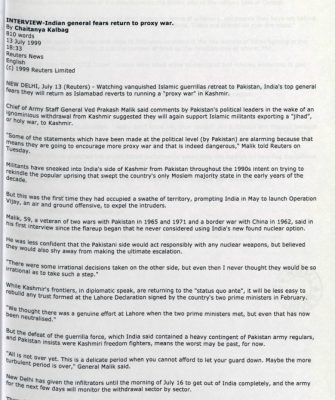INTERVIEW-Indian general fears return to proxy war.
[Reuters]
Published date: 13th Jul 1999
13 July 1999
Reuters News
English
(c) 1999 Reuters Limited
NEW DELHI, July 13 (Reuters) – Watching vanquished Islamic guerrillas retreat to Pakistan, India’s top general fears they will return as Islamabad reverts to running a “proxy war” in Kashmir.
Chief of Army Staff General Ved Prakash Malik said comments by Pakistan’s political leaders In the wake of an gnominious withdrawal from Kashmir suggested they will again support Islamic militants exporting a “jihad”, or holy war, to Kashmir.
Some of the statements which have been made at the political level (by Pakistan) are alarming because that means they are going to encourage more proxy war and that is Indeed dangerous,” Malik told Reuters on Tuesday.
Militants have sneaked into India’s side of Kashmir from Pakistan throughout the 1990s intent on trying to rekindle the popular uprising that swept the country’s only Moslem majority state in the early years of the decade.
But this was the first time they had occupied a swathe of territory, prompting India in May to launch Operation Vijay, an air and ground offensive, to expel the intruders.
Malik, 59, a veteran of two wars with Pakistan in 1965 and 1971 and a border war with China in 1962, said in his first interview since the flareup began that he never considered using India’s new found nuclear option.
He was less confident that the Pakistani side would act responsibly with any nuclear weapons, but believed they would also shy away from making the ultimate escalation.
There were some irrational decisions taken on the other side, but even then I never thought they would be so irrational as to take such a step.”
While Kashmir’s frontiers, in diplomatic speak, are returning to the “status quo ante”, it will be less easy to tiers, In rebuild any trust formed at the Lahore Declaration signed by the country’s two prime ministers in February.
We thought there was a genuine effort at Lahore when the two prime ministers met, but even that has now been neutralised.”
But the defeat of the guerrilla force, which India said contained a heavy contingent of Pakistan army regulars, and Pakistan insists were Kashmiri freedom fighters, means the worst may be past, for now.
All is not over yet. This is a delicate period when you cannot afford to let your guard down. Maybe the more turbulent period is over,” General Malik said.
New Delhi has given the infiltrators until the morning of July 16 to get out of India completely, and the army for the next few days will monitor the withdrawal sector by sector.
There is no formal ceasefire, but Indian troops will train guns on the retreating guerrillas without pulling the trigger, so long as they stick to a schedule agreed with Pakistan’s generals.
General Malik will only declare Operation Vijay successfully completed when the last fighter is expelled from Indian soil.
The time limit that has been laid down for withdrawal from the Kaksar sector is over. We are In the process of verifying now on the ground that they have gone. They have also started withdrawing from Mushkhoh and that will go on until the 14th.
General Malik said the bodies left behind confirm the role played by the Pakistani Army, primarily the Northern Light Infantry, in the occupation of the mountains on the Indian side of the military Line of Control.
There is so much of evidence in terms of dead bodies, in terms of prisoners, documents they have left behind, the weapons they have left behind, the identity cards and letters. These are littered all over the place.”
India says it lost nearly 400 men and close to 600 were wounded in the two months of bitter fighting in the inhospitable Himalayan territory. It put the number of dead on the Pakistan side at almost 700.
Pakistan said more than 1,700 Indian soldiers were killed while its own dead and missing amounted to just over 200.
Malik said the enemy had surprised India’s border patrols by executing a commando style operation to secure heights commanding a highway linking the Kashmir valley to the remote Ladakh region.
But he said the Pakistani strategy was a gamble that appeared to lack an end-game.
“I think it was a huge miscalculation. I really don’t know why they couldn’t see it through and through because yes, they were able to surprise us in the beginning, but they should have been able to see beyond that, that there was no chance of success.”
General Malik said he expected the armed forces performance would help win support for boosting the defence budget, which has been kept in check for the past few years.
“There is a need to spend more money. There are some systemic changes that are called for.”






